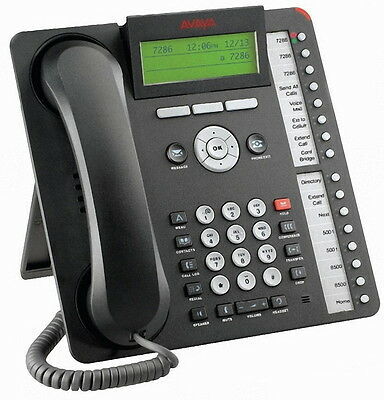Business Phone Systems Purchasing Guide
This article guides you through the three types of business telephone systems you can choose from. You’ll learn how each works, the features and benefits they provide and compare the costs for each system. We include an overview of the basic and advanced features available in every phone system. Finally, we offer some questions to help guide you toward choosing the right phone system for your business.
Introduction to Business Telephone Systems
There are two general categories of phone systems that businesses use, on-premise and hosted phone systems.
On-premise phone systems are the more traditional private branch exchange networks, or PBX, and land-line systems. Modern on-premise systems use VoIP technology. You need to purchase or lease the phone equipment including handsets and servers. You’ll need an IT department, either in-house or outsourced, to maintain the equipment and manage software upgrades. On-premise phone systems are designed for businesses who have an on-site workforce.
Hosted, or cloud-based, phone systems don’t require on-site equipment and software, providing a cost-effective alternative to traditional phone systems. Hosted phone systems work with any type of equipment including smartphones. It’s an option for businesses that have remote employees working from the field or from their homes. You can connect to a hosted system through any internet connection, and some include mobile apps for maximum productivity.
Here’s a look at three specific types of phone systems you’ll find used by small, medium, and large businesses.
Types of Business Phone Systems
PBX Phone Systems
- How they work. PBX systems use hardware, software, and telephone line switches to route calls at your location.
- Features and benefits. PBX systems are programmable and can be easily maintained and upgraded by your IT staff. Call information is maintained on local servers providing your business with privacy and security.
- Costs. $120 to $220 per extension or user. Factoring in costs for infrastructure, servers, and equipment, consider an $11,000 investment for a mid-level system that handles 50 extensions.
VoIP Phone Systems
- How they work. VoIP integrates PBX hardware and handsets with voice or internet protocol technology allowing you to use digital communication and web-enabled devices.
- Features and benefit. VoIP allows integration with CRM and other cloud-based calling features while supporting in-house call routing and call management features.
- Costs. $60 to $400 per unit. Adding servers and software licensing, the capital expenditure can range from $35- to $7,500 for smaller systems up to $19,000 to $25,000 for larger enterprise systems that handle 400+ extensions. {' '}
Virtual Cloud-based Phone Systems
- How they work. Virtual phones systems are managed and operated completely on the internet, with no physical location required to house phone lines or equipment.
- Features and benefits. You can set up a virtual system with a small start-up investment. Employees can connect from a variety of devices, and you can manage all your business communications from your computer or a phone app.
- Costs. $19 to $40 per month for each user and extension supported. {' '}
Buying Considerations: Advice for Choosing the Right Phone System
Whether you choose on-premise or hosted phone service, look for these basic features to be included.
- Auto attendant
- Conference calling
- Dial by name, extension, or from directory
- On-hold music
- Voicemail
On-site systems should include telephone handsets with multi-function display screens and speakerphones. Hosted phone systems should be accessible from any internet connection and include an app that is compatible with any smartphone. {' '}
- Advanced features that allow you to create an enterprise-level communications management system for your business include automatic call distribution, computer technology integration, call forwarding and call convergence.
- Automatic call distribution supports quality monitoring and call recording, and CRM integration to automate sales and customer service processes.
- Call centers and contact centers rely on computer technology integration to simplify outbound dialing and to expedite access to customer records during inbound calls.
- Call forwarding supports offsite and after-hours call routing. While call convergence supports text, live-chat, video, and social media integration with your basic communication system. {' '}
Before you decide on a phone system, software, or equipment, fully analyze your most important business needs. Here are some questions that will help you determine the best type of phone system for your physical location, budget, and type of usage. {' '}
Infrastructure
- What type of phone system does your facility support?
- Are you in an older building that requires modifications to older legacy-type phone lines and equipment?
- Do you have physical space for the servers required to house an on-premise phone system?
Scalability
- How will your business communications needs change over the short- and long-term?
- Are you transitioning to a mobile workforce, or are you a growing contact center with expanding need for more in-house phone lines?
Acquisition costs
- What is your budget and how much do you plan to invest in upfront costs to set up your phone system?
- Do you plan to lease, purchase, or finance the telephone equipment?
Ownership costs
- How will you handle the cost of ongoing system maintenance and upgrades?
- Have you budgeted additional personnel costs for in-house IT services?
- Will you pay for a maintenance plan with your phone provider or another third-party vendor?
Features
- What is the most important function you need your phone system to serve?
- Do you need to route internal calls quickly and efficiently, or do you need to provide off-site employees with a communication hub with call routing, voicemail, and other services?
Find the Right Vendor
If you choose a PBX or VoIP system, look for a vendor that services businesses in your size range. Find out if they provide IT services to maintain your hardware and software, and if they can work with the infrastructure at your locations. If you choose a hosted phone system, consider the ease of use and set up of the virtual extensions and what features are services are included in your monthly costs. With either type of system, make sure you choose a system that is scalable and be adapted as your business changes and grows. {' '}

